
February 21, 2026
How to Prevent Keloid Scars After Surgery A Definitive Guide
Discover how to prevent keloid scars after surgery with our definitive guide. Learn expert strategies for risk assessment, surgery, and post-op scar care.
Nov 22, 2025
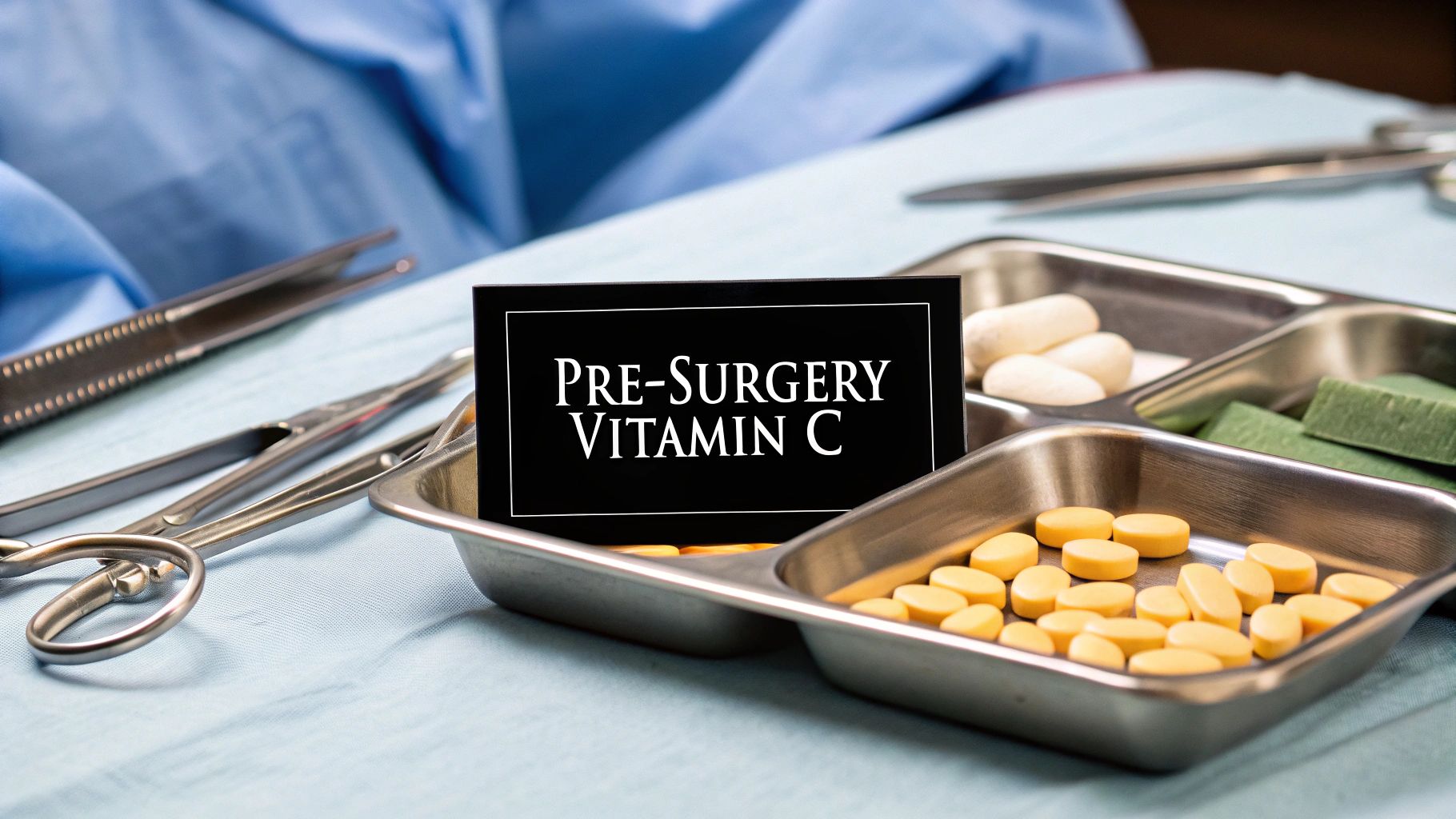
You've probably heard that taking vitamin C before surgery is a good idea. It's often recommended to help with wound healing and give your immune system a boost. But it’s not as simple as just grabbing a bottle off the shelf. This is a decision that requires a real conversation with your surgeon to make sure it's the right move for your specific procedure and health situation.
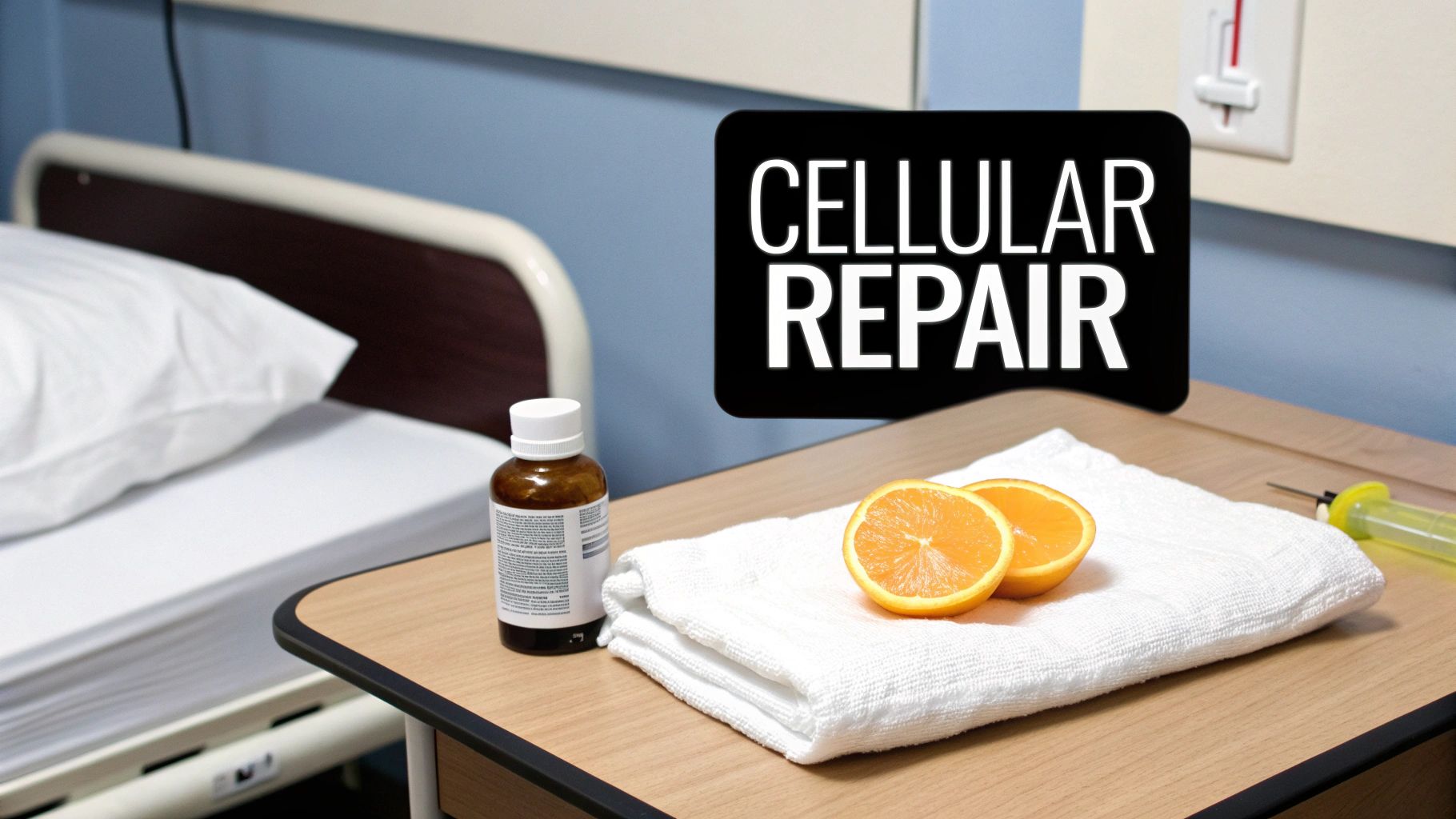
Any kind of surgery, whether it's an elective cosmetic procedure or a necessary reconstruction, is a major event for your body. It’s not just the mental anticipation; it's a physical trauma that kicks off a complex, demanding healing process.
Think of it like this: your body is a construction site where a major, unexpected renovation just began. To get the job done right and on time, the crew needs plenty of raw materials. Vitamin C, or ascorbic acid, happens to be one of the most important supplies on the list.
The physical stress of surgery unleashes a wave of oxidative stress throughout your body. This is essentially a biological imbalance where volatile molecules, known as free radicals, start damaging healthy cells. Picture them as tiny, out-of-control sparks flying from the construction equipment, capable of starting small fires everywhere.
Vitamin C steps in as the master fire extinguisher. As a potent antioxidant, it neutralizes those damaging free radicals, calming the chaos and creating a stable environment where real healing can begin.
Beyond just putting out fires, vitamin C has a hands-on role in the rebuilding process. It's an absolutely essential ingredient for making collagen, the protein that acts as the scaffolding for your skin, blood vessels, and eventually, the new scar tissue.
If you don't have enough vitamin C, your body’s ability to produce strong collagen slows to a crawl. This can lead to weaker tissue and a healing process that drags on.
During recovery, your body's demand for vitamin C goes through the roof. Your immune system is also working overtime to fight off potential infections, and it burns through vitamin C reserves to do so. This is why surgeons often suggest supplementation—it ensures your internal "cellular repair crew" has all the tools and manpower it needs for the big job ahead.
Properly preparing your body is one of the most effective things you can do to ensure a great result. For patients getting cosmetic work done, learning how to support your body's healing power is central to https://www.ccplasticsurgery.com/blog/optimizing-your-recovery-after-plastic-surgery-procedures.
When you combine smart nutritional support with a solid post-op care plan, you create the best possible foundation for a smooth recovery. Taking a holistic view, which includes insights from a practical guide to recovering from surgery at home, can make a world of difference. This proactive approach gives your body everything it needs to heal efficiently, minimize complications, and ultimately protect the beautiful results you’re looking forward to.
Think of any surgery, big or small, as both a marathon and a major construction project for your body. The physical stress is enormous. This high-stakes environment kicks off a chain reaction of physiological responses that burn through your body's vital resources at an incredible pace. Vitamin C, a nutrient your body can't make on its own, is one of the first and most important resources to get used up.
Picture your body’s vitamin C supply like a full tank of gas. On a normal day, you use that fuel pretty efficiently. But surgery? That’s like hitting the afterburners. The intense process of inflammation, the massive immune response needed to fight off infection, and the all-hands-on-deck effort of tissue repair all demand huge amounts of vitamin C to work properly.
This sudden, massive demand puts a serious drain on your reserves. It often leaves your body running on fumes right when it needs that nutrient the most. We're not talking about a minor dip, either. The biological trauma of surgery acts like a sponge, soaking up every available bit of vitamin C from your blood and tissues to fuel the healing process.
So, why the rapid drain? It all comes down to vitamin C's two main jobs: it's a primary antioxidant and a master coordinator for cellular repair.
During surgery, tissue damage unleashes a flood of free radicals. These are unstable molecules that wreak havoc on a cellular level, a lot like how rust corrodes metal. Vitamin C is your body's frontline defense, sacrificing itself to neutralize these free radicals and shield healthy tissue from this "oxidative stress."
At the same time, your body is kicking collagen production into high gear to start rebuilding. Vitamin C is the essential foreman for this collagen "construction crew." Without enough of it, the entire rebuilding project slows down, which can compromise how well and how quickly you heal. This is precisely why learning how to care for surgical incisions is a process that starts well before you ever get to the operating room.
The metabolic storm that surgery creates doesn't just use up vitamin C; it actively reroutes it to the "emergency sites"—the areas of tissue damage and inflammation. This targeted deployment leaves fewer reserves for all the other important jobs your body has to do, which really underscores why you want to go into surgery with optimal levels.
While surgery depletes vitamin C in everyone, some people are starting from a more vulnerable position. Their baseline levels might already be low, meaning the stress of an operation can push them from "a little low" to "seriously deficient" very quickly.
Groups at a higher risk often include:
For anyone in these groups, a smart plan for taking vitamin C before surgery is even more crucial. Research backs this up, too. One study found that up to 30% of patients had suboptimal vitamin C levels after major surgery, a factor that can directly slow down healing. You can dig into the full research on this topic over on the National Library of Medicine website. By proactively addressing this potential shortfall, you give your body the strong foundation it needs to heal as effectively as possible.
Let's move from the "why" to the "what." It's one thing to understand the theory behind vitamin C and healing, but what does the actual clinical research say? The biological reasoning is solid, but the real proof is in patient outcomes from controlled studies. For years, researchers have been digging into this, looking at everything from how fast wounds close to how much pain patients feel, giving us a pretty good evidence base to work from.
The strongest connection we see in the research is between vitamin C and collagen. Think of collagen as the literal thread that stitches your tissues back together after an incision; it’s the protein that gives your skin its strength. Vitamin C is a critical part of the assembly line for making that collagen—without it, the whole process grinds to a halt.
This is why the stress of surgery is a double-edged sword. It creates the wound that needs healing, but it also burns through your body's vitamin C reserves, creating a much higher demand for the very nutrient you need to recover.
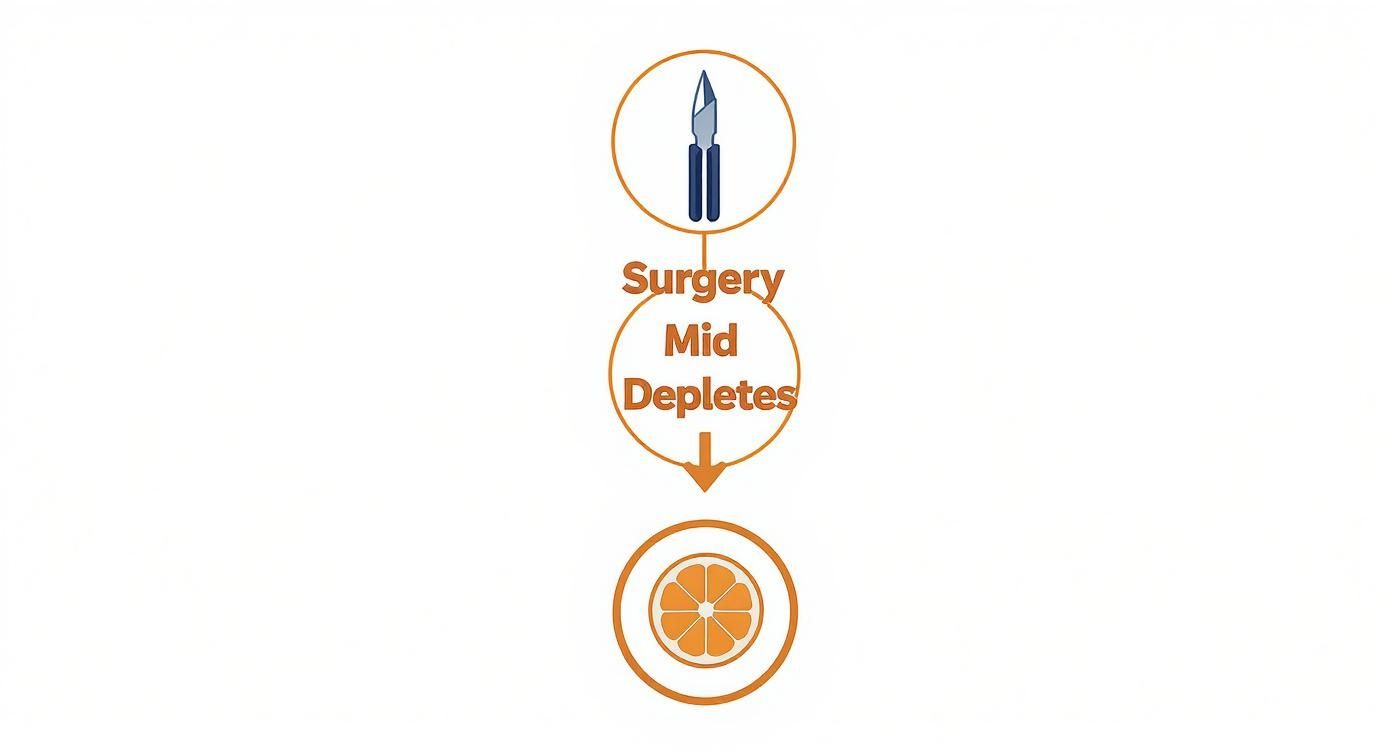
This simple diagram perfectly illustrates the core problem: surgery depletes the exact resource your body is screaming for to repair the damage. This makes getting your levels right before you're on the table so important.
Beyond just closing the wound, studies have also looked at vitamin C's role in propping up your immune system during that vulnerable post-op period. An incision is an open door for infection, and your immune cells—especially your white blood cells—need high concentrations of vitamin C to work properly. The idea is that if your levels are topped up, your body is better armed to fight off any opportunistic bugs.
Inflammation is the other big piece of the puzzle. A little bit of inflammation is a good thing; it’s a sign your body’s repair crew has arrived on the scene. But too much for too long leads to more pain, swelling, and a sluggish recovery. As a potent antioxidant, vitamin C helps keep that inflammatory response in check so it doesn't get out of hand.
Clinical trials have shown that patients supplemented with vitamin C often exhibit lower levels of inflammatory markers in their blood after surgery. This suggests a more controlled and efficient healing environment at a cellular level.
Basically, it helps your body's recovery process stay balanced and productive instead of becoming overwhelmed.
The benefits aren't just microscopic, either. Some of the most interesting research focuses on things patients can actually feel, like pain. One major review pulled together data from multiple high-quality trials involving thousands of patients. What they found was that taking vitamin C before surgery, usually in doses between 500 mg and 2 grams daily, was linked to a noticeable drop in post-op pain scores and less need for pain medication.
In some of these studies, researchers also saw a reduction in key inflammatory markers, like C-reactive protein, by up to 25% in the group taking vitamin C versus the placebo group. You can dig into the specifics of this comprehensive review in the National Library of Medicine archives.
When you look at all the evidence together, a clear picture emerges. While it’s certainly not a magic pill, the data strongly suggests that optimizing your vitamin C levels creates a much more favorable environment for healing. It supports your body’s natural repair work from several angles, potentially leading to stronger scars, a lower risk of infection, and just an all-around more comfortable recovery.
Now, it’s important to look at this with a critical eye. While many studies show clear benefits, others have found more modest or even inconclusive results. The real-world effectiveness of taking vitamin C before surgery can hinge on a lot of things—the type of procedure, the patient’s starting nutritional status, the exact dose used, and how long they took it.
Here’s a quick breakdown of where the evidence stands for different potential benefits.
Summary of Clinical Evidence for Preoperative Vitamin C
This table summarizes the findings from various studies on the effects of taking vitamin C before surgery, highlighting the strength of evidence for different outcomes.
This variability is exactly why there aren't hard-and-fast universal rules for every patient and every surgery. However, the overall trend in the science is positive, especially for major surgeries where the physical stress and healing demands are at their peak. The evidence gives you a solid foundation for having an informed conversation with your surgeon about whether adding vitamin C to your pre-op plan makes sense for you.
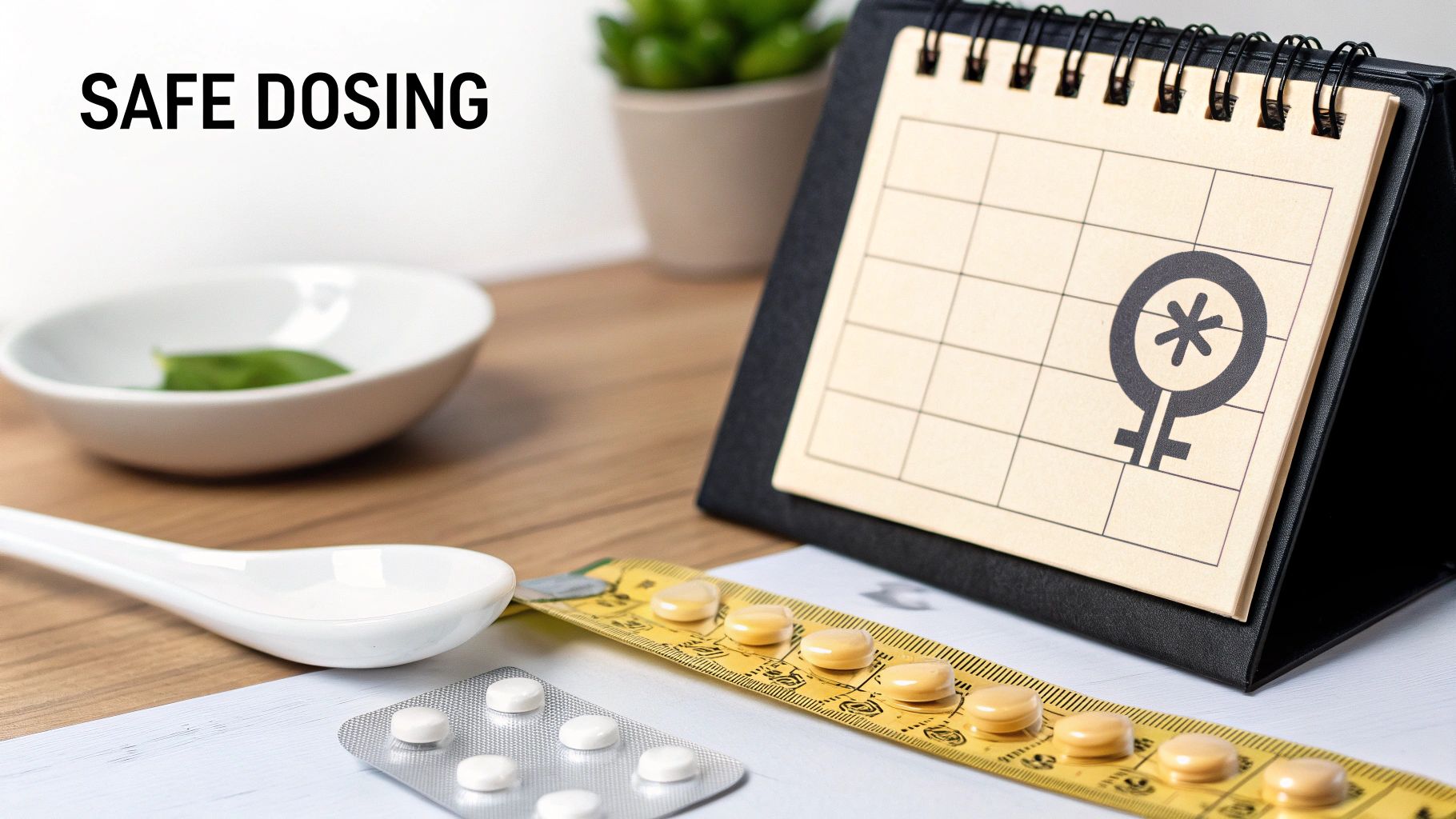
Knowing why vitamin C is helpful is one thing, but applying that knowledge safely is what really counts. When it comes to taking vitamin C before surgery, the "how" and "when" are just as critical as the "why." This isn't a case of "more is better." The goal is to hit a therapeutic sweet spot—the right dose, at the right time—to ensure your supplement plan actually helps your recovery, rather than getting in the way.
A solid plan is your best friend here. For a bird's-eye view of your entire pre-op journey, our guide on how to prepare for surgery offers a complete checklist that fits right in with your nutritional strategy, helping you walk into surgery day feeling ready and in control.
Think of it like this: your surgeon is the architect of your procedure. They'll give you the blueprints tailored specifically to your health and surgery, and that includes any advice on supplements.
Forget the standard Recommended Daily Allowance (RDA) you see on cereal boxes—that’s 90 mg for men and 75 mg for women. The goal before an operation isn't just to avoid a deficiency; it's to load your tissues with enough of this key nutrient to handle the intense demands of healing.
Clinical studies on surgical patients have explored a pretty wide range of dosages:
The most common recommendation you'll find from surgeons and in medical literature lands squarely between 500 mg and 1,000 mg a day, often split into two doses. This gives your body a serious boost over what you get from food alone, without pushing into territory where side effects become more likely.
This amount ensures your body's "collagen-building crew" has all the raw materials it needs, right when it needs them most.
Timing is everything. Starting a high dose of vitamin C the day before surgery is like trying to cram for a final exam the night before—it’s just too late to make a real difference. The idea is to gradually build up your body’s reserves so you’re fully optimized when you head into the operating room.
Most surgeons and pre-op protocols suggest starting a vitamin C supplement one to two weeks before your scheduled procedure. This lead time gives your body plenty of time to absorb the nutrient and stash it away in your skin and other tissues. You'll then likely be advised to continue taking it for at least two to three weeks post-op to support the busiest phases of wound repair and scar maturation.
Vitamin C is water-soluble, which means your body flushes out what it doesn't use, making it generally very safe. However, high doses aren't completely without potential hiccups, and it's smart to know what they are.
The most common issue by far is an upset stomach. Pushing past 2,000 mg per day can sometimes lead to:
For most people, these problems are mild and easily fixed by splitting the dose throughout the day or choosing a "buffered" form of vitamin C, like calcium ascorbate, which is much gentler on the stomach. If you're curious about how different forms are absorbed, you can dive into the science behind vitamin absorption to see what might work best for you.
A more serious, though much less common, concern is a slightly increased risk of kidney stones, but this is typically only a worry for people who already have a history of them. High doses can raise oxalate levels in the urine, which is a component of the most common type of kidney stone.
Finally, and most importantly, vitamin C can potentially interact with certain medications. At very high doses, it might have a mild blood-thinning effect or interfere with how some cholesterol drugs or chemotherapy agents work. This is exactly why 100% honesty with your surgical team is non-negotiable. Tell your surgeon about every single pill and supplement you take—even if it seems "natural"—to prevent any unexpected complications on surgery day.
While all the science points to some real benefits, the most important voice in this conversation is your surgeon's. They are ultimately in charge of your safety and your results, so their guidance is the final word. Think of them as the architect of your procedure; you wouldn't start swapping out building materials without their sign-off.
Bringing up your plan to take vitamin C isn't about challenging their expertise. It's about being an active, informed partner in your own care. An open, honest conversation is the best way to make sure everyone is on the same page for a smooth recovery.
When you sit down with your surgeon or their team, be ready to talk through a few key things. They need the full picture of your health to give you the right advice.
Be prepared to discuss:
Giving them this information helps them see you as a whole person, not just a procedure. It lets them offer personalized advice that works with their surgical plan, not against it.
It's really important to know that there's no one-size-fits-all rule for vitamin C and surgery. The advice your friend got for her procedure might be totally wrong for yours, even from the same doctor. Why? Because the physical stress of different surgeries can be worlds apart.
A major reconstructive surgery that involves repairing a lot of tissue puts a huge strain on your body's healing reserves. In a situation like that, a surgeon is far more likely to recommend a higher dose of vitamin C. On the other hand, for a less invasive cosmetic tweak on an already healthy person, that same level of supplementation might be overkill.
Your surgeon's recommendation is a custom calculation. They're weighing the specific demands of your surgery against your personal health profile to map out the safest, most direct route to a great outcome.
Don't be surprised if your surgeon seems a bit hesitant or neutral about you taking high doses of supplements. This isn't because they're ignoring the science. It's usually rooted in a deep-seated commitment to patient safety and sticking to what's been proven time and again. Many surgeons are conservative because major medical organizations haven't issued universal guidelines on this yet.
The clinical data, while very promising, isn't a slam dunk across the board. For example, one major study looked at patients having heart surgery. They found that giving them 1 gram of vitamin C twice daily was perfectly safe, but it didn't actually shorten their hospital stay or prevent complications. You can read more about these complex clinical findings and see just how much the context matters. This is exactly why surgeons weigh the specifics of your surgery so carefully.
At the end of the day, your surgeon’s number one job is to keep you safe. By having a clear and honest talk, you’re giving them the information they need to provide the best possible guidance, making sure every decision you make leads to a safe surgery and the beautiful result you want.
Figuring out which supplements to take before surgery can feel like a maze. You want to do everything you can for a smooth recovery, but the internet is full of conflicting advice. To help cut through the noise, let's tackle some of the most common questions patients ask about taking vitamin C before surgery.
Think of this as a practical FAQ to clear up your biggest concerns, build on what we've already discussed, and give you the confidence you need to talk things over with your surgeon.
That's a great question, and it gets right to the heart of how the scale of a procedure changes things. While any kind of healing benefits from good nutrition, the physical stress of a minor procedure like a tooth extraction is worlds away from major surgery. Your body’s demand for vitamin C just won't spike in the same way.
For most healthy people who eat a reasonably balanced diet, there's really no need to start extra vitamin C supplements for a simple dental extraction. The nutritional reserves you already have are more than capable of handling that level of tissue repair.
Now, there are a few exceptions. If you're a smoker or have a condition known to slow down healing (like diabetes), your dentist or oral surgeon might suggest a short course of supplements. In those specific cases, the boost to your healing capacity could be worth it, even for a minor procedure.
The bottom line: Just ask the person doing the procedure. They know exactly what the physical demands are and can give you advice that’s tailored to your health. For small stuff, don't assume you need it—always confirm.
For day-to-day health? Absolutely. A diet packed with fruits and vegetables like oranges, bell peppers, strawberries, and broccoli is the best way to keep your vitamin C levels where they should be. When you eat a colorful variety of whole foods, you're also getting a whole symphony of other micronutrients that work together to keep you healthy.
But preparing for surgery is a completely different ballgame. The therapeutic doses that have been studied for surgical recovery—usually between 500mg and 2,000mg per day—are incredibly hard to hit with food alone.
Just to give you some perspective, you’d have to chow down on about 8 large oranges or more than five cups of broccoli just to get to the low end of that 500mg range. Trying to eat that much every single day, on top of everything else you're dealing with before and after surgery, just isn't realistic for most of us.
Here’s a good way to think about it: your healthy diet is the foundation, but a preoperative supplement is a temporary, high-impact tool. It’s there to meet the extraordinary demands of healing, delivering a consistent, powerful dose right when your body needs it the most.
Yes, and this is a really important one. While vitamin C is a huge help in most surgical situations, there are times when taking high doses could actually be a bad idea. This is precisely why having a one-on-one talk with your surgeon is non-negotiable.
Certain medical conditions and treatments can be complicated by high-dose antioxidants. A few key examples include:
Your surgeon and anesthesiologist are the only ones with the full picture—your health history, your medications, and the exact details of your procedure. They can properly weigh the benefits against any potential risks for you and give you the final go-ahead.
When you walk down the vitamin aisle, it's easy to get overwhelmed. You'll see standard ascorbic acid, buffered versions, liposomal formulas, and more. It’s natural to wonder which one is right for surgery prep.
Honestly, for most people, standard ascorbic acid is perfectly fine. It's affordable, effective, and it’s the form that has been used in the overwhelming majority of clinical studies on surgical recovery. All that scientific evidence we have is based on this simple, common form.
The only catch is that ascorbic acid is, well, an acid. At higher doses, it can sometimes cause an upset stomach or acid reflux. If you find that’s the case for you, a "buffered" version is a fantastic alternative.
You might see newer, fancier forms like liposomal vitamin C, which claim better absorption. While the technology is interesting, there isn't yet solid, large-scale evidence showing it leads to better surgical outcomes than the standard stuff. The most important thing is simply taking a dose your doctor has approved, and taking it consistently.
At Cape Cod Plastic Surgery, our top priority is making sure you feel prepared, confident, and cared for every step of the way. If you have more questions about getting ready for your procedure, we invite you to schedule a consultation with us. Visit us online at https://ccplasticsurgery.com to learn more about our approach to patient care and surgical excellence.

February 21, 2026
Discover how to prevent keloid scars after surgery with our definitive guide. Learn expert strategies for risk assessment, surgery, and post-op scar care.
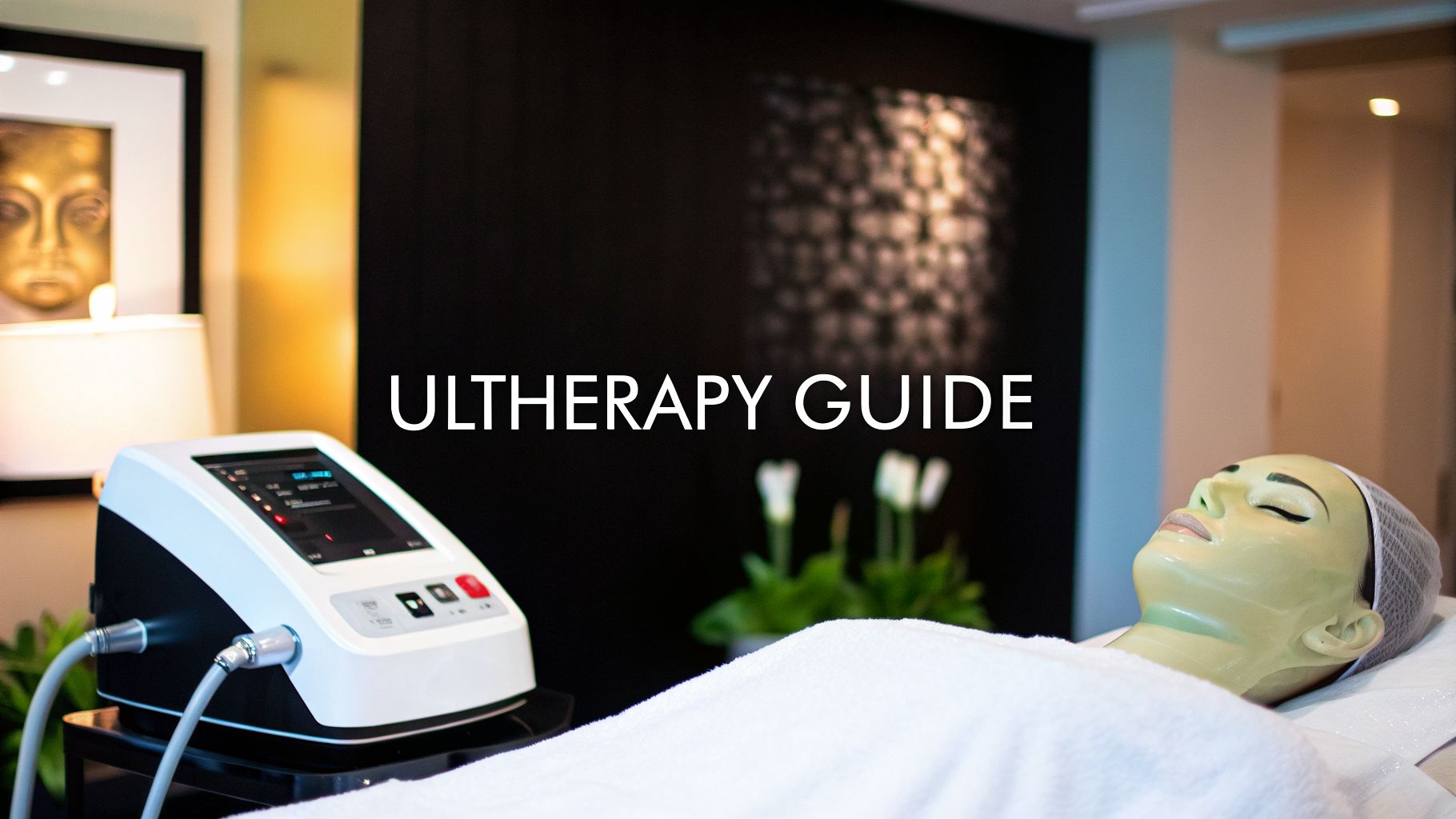
February 20, 2026
What is Ultherapy treatment? Explore this non-surgical facelift, how it uses ultrasound to lift skin, and what results you can expect from the procedure.

February 19, 2026
Explore stunning cheek filler before and after results. See real patient photos, learn about filler types, and discover what's possible for your facial contour.